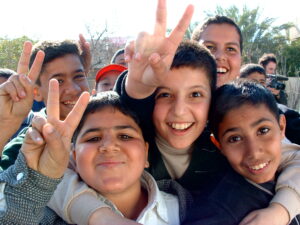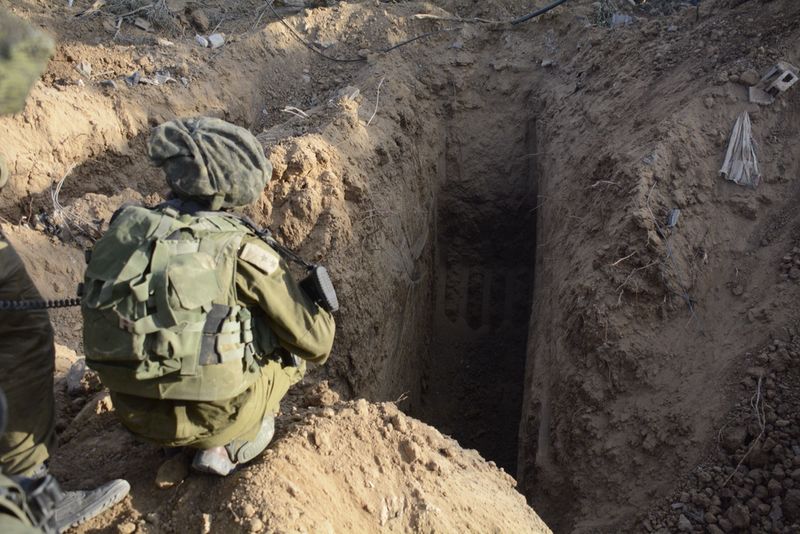| Contribute a translation | Source (English) |
|---|---|
In all of our moods, God, we call out to You and You are there. When we are happy and when we are sad, when we are lonely or afraid, when we want to say thank you for the blessings that we have and when our hearts are bursting with good things we want to share, You are there. Just to say Your name feels good and helps us to feel close to You. You have many names, God, a name for all of our many moods. One of your names is Shalom. | |
We call to You now by Your name, Shalom. In this time of war we are often confused and afraid and we need to find peace within ourselves. It is sometimes hard to know what is right and what is wrong. In this time of war help us to remember how much Your world needs Peace. As we whisper Your name Shalom with our lips, help us to hear Your name of Peace in our hearts and to make it real in the world. | |
Spread over our soldiers Your shelter of Peace. Bring them home quickly, our soldiers who are sons and daughters, husbands and fathers, brothers and sisters; our soldiers who are aunts and uncles, nieces and nephews, cousins and friends and neighbors. They are just like us and were children not so long ago. | |
As we pray for them, help us to pray for the Iraqis too. They too are people like us, people who love and are loved, people who laugh and cry and sing and dance and hug their children. Yes, most of all protect the children who are surrounded by war and bring home the people whose hugs make them feel happy and safe. | |
You have taught us that You do not delight in the destruction of the wicked. That is why we pour off a drop of wine for each of the ten plagues at the Pesach Seder, and that is why we read the names of Haman’s sons in one breath when we read the Megillah on Purim. Therefore, help us to find ways other than war to stop those who hurt others in the world. | |
Help us to remember that war is not a sporting event or a video game, even though it seems like it sometime, the way people talk about it. Real people suffer and die in war, including children, and many things that people need to live are destroyed, including Your Creation, the earth itself. | |
As Rabbi Yudan son of Rabbi Yossi taught of You so long ago, “may we also teach, Great is Peace, for the name of the Holy One is called Shalom.”[1] Cf. Leviticus Rabbah 9.9 on Judges 6:24 ‘Then Gidōn built an altar there to YHVH and called it YHVH Shalom.' | |
Blessed are You, God, Whose name is Shalom. Spread Your shelter of Peace over us, and help us to make peace in Your world. And let us say, Amen. |
Rabbi Victor Reinstein’s “Prayer for Peace in a Time of War” was written in the context of the 2003 invasion of Iraq by the United States and allied forces while he served as rabbi to the Solomon Schechter Day School in Newton, Massachusetts. (The prayer can also be found at the website of the Jewish Peace Fellowship, here.) In addition to composing this prayer, he wrote the following essay on introducing a pedagogy of peace to Jewish educators:
TALKING ABOUT PEACE IN A TIME OF WAR: EMPOWERING CHILDREN TO BE ACTORS IN GOD’S WORLDAs we grapple now with the reality of war thrust upon us the questions and wellbeing of our children assume primacy. To the degree that we wrestle with our own feelings, opinions and beliefs, it becomes easier to respond to the concerns of our children. As Jewish tradition guides us in all realms of life, so too there is guidance and wisdom to be drawn upon for talking with our children about war and for helping them to look beyond war. Following are one rabbi’s reflections.
• Central to the survival of the Jewish people has been our ability to look beyond the trials of the moment. Hope and a vision of what might be has drawn us forward in spite of all that would deny the better day. This is where we can begin to talk with our children, from the perspective of our people’s steadfast hold on hope, our refusal to give in to despair, our certainty in a better way and time. These are the time-tested lessons of our own proud history, a legacy to share and to celebrate with our children.
• While Jewish tradition provides a legal framework within which war is to be carried out, a framework meant to curb brutality, peace remains an ultimate concern, the goal of human history. We might discuss with our children ways in which Judaism teaches about peace as a hope for the world. We can begin with the simple words, Shabbat Shalom, as more than a greeting, but a prayer for a time when the world will be filled every day with the peace that Shabbat represents. On Shabbat we live and behave in a way that creates a more peaceful environment and we try to bring some of that way into the days of the week. Look together at the end of most major prayers, Ḳaddish, Amidah, Birkat haMazon, and notice that they all end with a prayer for Peace. Such study and discussion creates a sense of affirmation and hope.
• There is an inspiring body of Jewish peace literature. In Midrash Rabbah for Parashat Tsav,[2] Cf. Leviticus Rabbah 9.9 the Torah portion for the week the war began, there is a collection of teachings on peace, each one beginning with the words, Gadol haShalom, Great is Peace. Rabbi Yossi said, “Great is peace, for even in time of war we should first talk of peace.” This is a time to talk with each other, with our friends and with our children. What might it mean to begin with talk of peace? How shall we conduct what might be difficult discussion? As dialogue, true discussion involves listening to each other and honoring different opinions and those who hold them. Engaging in respectful dialogue fosters a more peaceful context for our own lives. While we often feel powerless to affect events in the world, we do have the ability to bring greater peace to our own immediate surroundings, within ourselves and among ourselves.
• The rabbis taught, “Learning is great, for learning leads to doing….”[3] Cf. Ḳiddushin 40b In Jewish tradition learning is a type of action in itself that is meant to lead to action in the world. Based on your own inclinations, what kind of actions can you undertake as a family? The span of possibility is great, a letter to the president expressing your opinion, letters to soldiers, a sign proclaiming your opinion, bringing your sign and gathering with others of like mind. Jewish tradition teaches that we are meant to be actors in God’s world, not passive bystanders. Doing something to express your feelings can foster a greater sense of security and confidence than passively watching events unfold.
• Prayer is an act of joining, of joining ourselves to God, to our selves, to each other, so that we are not alone. Prayer is an affirmation of faith and hope and ideals, while acknowledging fear and anxiety and frailty. As a moment of pause, prayer offers a peaceful haven from all that assails us in the course of living. Prayer itself is an answer. Whether or not we are accustomed to praying with our children, whether or not prayer is part of our own personal practice, times of stress can be an invitation to pray. Prayer can be a response to discussion with our children, turning words of concern, of anxiety, of fear, of anger, of confusion, into words of prayer. Address God in whatever way feels comfortable, or use no direct address at all (it will get there just the same!). Compose prayers together as a family, formed spontaneously in the moment, or put thoughts to paper in a time of reflective quiet, perhaps as a letter to God. Sing familiar prayerful verses of peace, such as Oseh Shalom. Form prayer that is directed to those most affected by war, soldiers, Iraqis, especially children. Are there people you know or know of for whom there is direct concern? Form special prayers for them. Going to synagogue to pray with a minyan, or simply to be in the presence of others who share your concern brings the comfort and support of a community.
• Mima’amaqim q’ratikha hashem…, Out of the depths I have called to You, God….[4] Psalms 130:1 The saying of Psalms is a form of prayer. Especially in times of danger and distress Jews have traditionally found comfort and strength in the saying of psalms. Reciting psalms can be calming. You can open the Tanakh or any book of Psalms and begin wherever you find yourself. You may want to look at such psalms as 3, 6, 23, 34, and 130. Creating psalm-like poetry with children can also be a form of prayerful expression.
• We need to teach our children that violence is the most serious sin, and that it destroys the human soul…. (Rabbi Sholom Noaḥ Berezovsky, the Slonimer Rebbe) Whatever one’s political perspective on this war, war itself is the most extreme form of violence and the greatest human tragedy. War represents our failure to harness the magnificent potential of human ingenuity to develop alternate responses to conflict and other means for the eradication of evil. Every bomb and every bullet is a reminder of how far we have yet to go to fulfill God’s hope for us, all God’s children, as partners in creation. With our own children, this can be a time to talk about the tragedy of violence and what we can do in our own small ways to reduce violence in our lives and in the world around us. As families we can examine video games for violence and pledge not to use them, and to encourage others to do the same, and to ask stores not to carry violent video games. In the same spirit we can talk with our children about television violence and discuss the meaning of war toys with the goal of household disarmament. Within our homes and workplaces we can try to find better ways to resolve our own conflicts. These simple acts are more than symbolic. For every personal act of violence that is not cast as a stone into the sea of humanity, there shall be one less ripple of violence flowing out into the world. Engaging together such matters of war and peace, violence and nonviolence, we shall be teaching our children that as violence destroys the human soul, so nonviolence as a way of life and change raises up the human soul to be worthy of God’s partnership in creating a better world.
Action is empowering. Prayer, study, letter-writing, demonstrating, making personal change to reduce violence, are all forms of action. Helping our children discover their own tools and inner resources to be actors in God’s world is a life long gift of empowerment toward peace, within themselves and in the world.
Rabbi Victor Reinstein
Notes

“Prayer for Peace in a Time of War, by Rabbi Victor Reinstein (2003)” is shared through the Open Siddur Project with a Creative Commons Attribution-ShareAlike 4.0 International copyleft license.










Leave a Reply